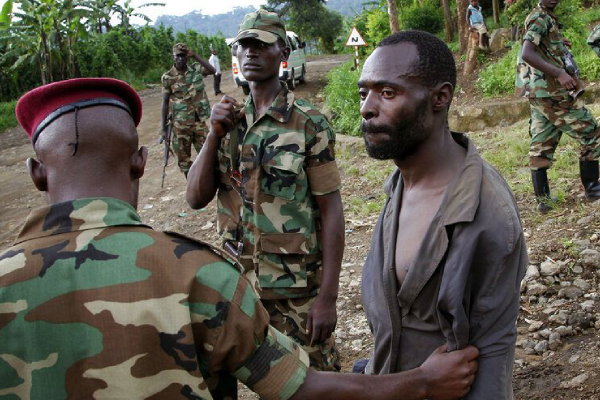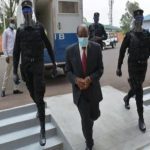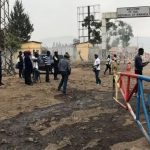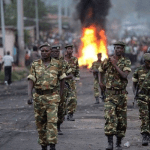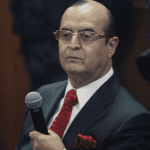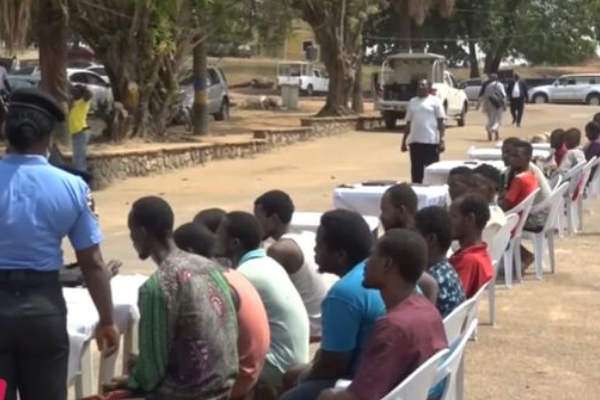Rwanda has accused the government of the Democratic Republic of Congo of “fabricating” the massacre committee by M23 rebels that cost 131 civilians their lives.
The Rwandan government said in a statement said the exaggerated Kishishe massacre was a fabrication by the DRC government which attributed it to the M23.
[wonderplugin_video iframe=”https://youtu.be/kk0pgYcYwzU” lightbox=0 lightboxsize=1 lightboxwidth=960 lightboxheight=540 autoopen=0 autoopendelay=0 autoclose=0 lightboxtitle=”” lightboxgroup=”” lightboxshownavigation=0 showimage=”” lightboxoptions=”” videowidth=600 videoheight=400 keepaspectratio=1 autoplay=0 loop=0 videocss=”position:relative;display:block;background-color:#000;overflow:hidden;max-width:100%;margin:0 auto;” playbutton=”https://www.tvcnews.tv/wp-content/plugins/wonderplugin-video-embed/engine/playvideo-64-64-0.png”]
The rebellion has taken control in recent months of territories in eastern Congo, a troubled region rich in mineral resources, which is aggravating tensions with Rwanda.
Talks between the democratic republic of Congo and Rwanda in Angola appeared to pave the way for a truce, but Kinshasa later accused the M23 of massacring civilians in the village of Kishishe.
The M23 has denied committing the massacre, citing “stray bullets” killed only eight civilians.
A Tutsi-majority rebel group, the M23 first made a name for itself when it took the eastern DRC city of Goma in 2012, before being driven out and going dormant.
Last month, talks in Angola between the DRC and Rwanda prepared the basis for a truce deal, but Kinshasa later accused M23 of killing 131 civilians in the town of Kishishe, according to a UN probe.
“The sensationalized ‘Kishishe massacre,’ a fabrication of the DRC government that it attributed to M23, has fast spread without any reputable organization investigating the facts,” Rwanda’s government said on Wednesday.
According to the report, “the incident was in fact an armed conflict between M23 and illegal armed groups connected to” the Congolese military forces.
M23 has denied responsibility for the atrocity, citing “stray bullets” for the deaths of only eight people.
Kigali has often accused Kinshasa of collaborating with the FDLR, a former Rwandan Hutu rebel group created in the DRC following Rwanda’s 1994 murder of mostly Tutsis.
Rwanda has accused the government of the Democratic Republic of Congo of “fabricating” the massacre committee by M23 rebels that cost 131 civilians their lives.
The Rwandan government said in a statement said the exaggerated Kishishe massacre was a fabrication by the DRC government which attributed it to the M23.
[wonderplugin_video iframe=”https://youtu.be/kk0pgYcYwzU” lightbox=0 lightboxsize=1 lightboxwidth=960 lightboxheight=540 autoopen=0 autoopendelay=0 autoclose=0 lightboxtitle=”” lightboxgroup=”” lightboxshownavigation=0 showimage=”” lightboxoptions=”” videowidth=600 videoheight=400 keepaspectratio=1 autoplay=0 loop=0 videocss=”position:relative;display:block;background-color:#000;overflow:hidden;max-width:100%;margin:0 auto;” playbutton=”https://www.tvcnews.tv/wp-content/plugins/wonderplugin-video-embed/engine/playvideo-64-64-0.png”]
The rebellion has taken control in recent months of territories in eastern Congo, a troubled region rich in mineral resources, which is aggravating tensions with Rwanda.
Talks between the democratic republic of Congo and Rwanda in Angola appeared to pave the way for a truce, but Kinshasa later accused the M23 of massacring civilians in the village of Kishishe.
The M23 has denied committing the massacre, citing “stray bullets” killed only eight civilians.
A Tutsi-majority rebel group, the M23 first made a name for itself when it took the eastern DRC city of Goma in 2012, before being driven out and going dormant.
Last month, talks in Angola between the DRC and Rwanda prepared the basis for a truce deal, but Kinshasa later accused M23 of killing 131 civilians in the town of Kishishe, according to a UN probe.
“The sensationalized ‘Kishishe massacre,’ a fabrication of the DRC government that it attributed to M23, has fast spread without any reputable organization investigating the facts,” Rwanda’s government said on Wednesday.
According to the report, “the incident was in fact an armed conflict between M23 and illegal armed groups connected to” the Congolese military forces.
M23 has denied responsibility for the atrocity, citing “stray bullets” for the deaths of only eight people.
Kigali has often accused Kinshasa of collaborating with the FDLR, a former Rwandan Hutu rebel group created in the DRC following Rwanda’s 1994 murder of mostly Tutsis.
Rwanda has accused the government of the Democratic Republic of Congo of “fabricating” the massacre committee by M23 rebels that cost 131 civilians their lives.
The Rwandan government said in a statement said the exaggerated Kishishe massacre was a fabrication by the DRC government which attributed it to the M23.
[wonderplugin_video iframe=”https://youtu.be/kk0pgYcYwzU” lightbox=0 lightboxsize=1 lightboxwidth=960 lightboxheight=540 autoopen=0 autoopendelay=0 autoclose=0 lightboxtitle=”” lightboxgroup=”” lightboxshownavigation=0 showimage=”” lightboxoptions=”” videowidth=600 videoheight=400 keepaspectratio=1 autoplay=0 loop=0 videocss=”position:relative;display:block;background-color:#000;overflow:hidden;max-width:100%;margin:0 auto;” playbutton=”https://www.tvcnews.tv/wp-content/plugins/wonderplugin-video-embed/engine/playvideo-64-64-0.png”]
The rebellion has taken control in recent months of territories in eastern Congo, a troubled region rich in mineral resources, which is aggravating tensions with Rwanda.
Talks between the democratic republic of Congo and Rwanda in Angola appeared to pave the way for a truce, but Kinshasa later accused the M23 of massacring civilians in the village of Kishishe.
The M23 has denied committing the massacre, citing “stray bullets” killed only eight civilians.
A Tutsi-majority rebel group, the M23 first made a name for itself when it took the eastern DRC city of Goma in 2012, before being driven out and going dormant.
Last month, talks in Angola between the DRC and Rwanda prepared the basis for a truce deal, but Kinshasa later accused M23 of killing 131 civilians in the town of Kishishe, according to a UN probe.
“The sensationalized ‘Kishishe massacre,’ a fabrication of the DRC government that it attributed to M23, has fast spread without any reputable organization investigating the facts,” Rwanda’s government said on Wednesday.
According to the report, “the incident was in fact an armed conflict between M23 and illegal armed groups connected to” the Congolese military forces.
M23 has denied responsibility for the atrocity, citing “stray bullets” for the deaths of only eight people.
Kigali has often accused Kinshasa of collaborating with the FDLR, a former Rwandan Hutu rebel group created in the DRC following Rwanda’s 1994 murder of mostly Tutsis.
Rwanda has accused the government of the Democratic Republic of Congo of “fabricating” the massacre committee by M23 rebels that cost 131 civilians their lives.
The Rwandan government said in a statement said the exaggerated Kishishe massacre was a fabrication by the DRC government which attributed it to the M23.
[wonderplugin_video iframe=”https://youtu.be/kk0pgYcYwzU” lightbox=0 lightboxsize=1 lightboxwidth=960 lightboxheight=540 autoopen=0 autoopendelay=0 autoclose=0 lightboxtitle=”” lightboxgroup=”” lightboxshownavigation=0 showimage=”” lightboxoptions=”” videowidth=600 videoheight=400 keepaspectratio=1 autoplay=0 loop=0 videocss=”position:relative;display:block;background-color:#000;overflow:hidden;max-width:100%;margin:0 auto;” playbutton=”https://www.tvcnews.tv/wp-content/plugins/wonderplugin-video-embed/engine/playvideo-64-64-0.png”]
The rebellion has taken control in recent months of territories in eastern Congo, a troubled region rich in mineral resources, which is aggravating tensions with Rwanda.
Talks between the democratic republic of Congo and Rwanda in Angola appeared to pave the way for a truce, but Kinshasa later accused the M23 of massacring civilians in the village of Kishishe.
The M23 has denied committing the massacre, citing “stray bullets” killed only eight civilians.
A Tutsi-majority rebel group, the M23 first made a name for itself when it took the eastern DRC city of Goma in 2012, before being driven out and going dormant.
Last month, talks in Angola between the DRC and Rwanda prepared the basis for a truce deal, but Kinshasa later accused M23 of killing 131 civilians in the town of Kishishe, according to a UN probe.
“The sensationalized ‘Kishishe massacre,’ a fabrication of the DRC government that it attributed to M23, has fast spread without any reputable organization investigating the facts,” Rwanda’s government said on Wednesday.
According to the report, “the incident was in fact an armed conflict between M23 and illegal armed groups connected to” the Congolese military forces.
M23 has denied responsibility for the atrocity, citing “stray bullets” for the deaths of only eight people.
Kigali has often accused Kinshasa of collaborating with the FDLR, a former Rwandan Hutu rebel group created in the DRC following Rwanda’s 1994 murder of mostly Tutsis.
Rwanda has accused the government of the Democratic Republic of Congo of “fabricating” the massacre committee by M23 rebels that cost 131 civilians their lives.
The Rwandan government said in a statement said the exaggerated Kishishe massacre was a fabrication by the DRC government which attributed it to the M23.
[wonderplugin_video iframe=”https://youtu.be/kk0pgYcYwzU” lightbox=0 lightboxsize=1 lightboxwidth=960 lightboxheight=540 autoopen=0 autoopendelay=0 autoclose=0 lightboxtitle=”” lightboxgroup=”” lightboxshownavigation=0 showimage=”” lightboxoptions=”” videowidth=600 videoheight=400 keepaspectratio=1 autoplay=0 loop=0 videocss=”position:relative;display:block;background-color:#000;overflow:hidden;max-width:100%;margin:0 auto;” playbutton=”https://www.tvcnews.tv/wp-content/plugins/wonderplugin-video-embed/engine/playvideo-64-64-0.png”]
The rebellion has taken control in recent months of territories in eastern Congo, a troubled region rich in mineral resources, which is aggravating tensions with Rwanda.
Talks between the democratic republic of Congo and Rwanda in Angola appeared to pave the way for a truce, but Kinshasa later accused the M23 of massacring civilians in the village of Kishishe.
The M23 has denied committing the massacre, citing “stray bullets” killed only eight civilians.
A Tutsi-majority rebel group, the M23 first made a name for itself when it took the eastern DRC city of Goma in 2012, before being driven out and going dormant.
Last month, talks in Angola between the DRC and Rwanda prepared the basis for a truce deal, but Kinshasa later accused M23 of killing 131 civilians in the town of Kishishe, according to a UN probe.
“The sensationalized ‘Kishishe massacre,’ a fabrication of the DRC government that it attributed to M23, has fast spread without any reputable organization investigating the facts,” Rwanda’s government said on Wednesday.
According to the report, “the incident was in fact an armed conflict between M23 and illegal armed groups connected to” the Congolese military forces.
M23 has denied responsibility for the atrocity, citing “stray bullets” for the deaths of only eight people.
Kigali has often accused Kinshasa of collaborating with the FDLR, a former Rwandan Hutu rebel group created in the DRC following Rwanda’s 1994 murder of mostly Tutsis.
Rwanda has accused the government of the Democratic Republic of Congo of “fabricating” the massacre committee by M23 rebels that cost 131 civilians their lives.
The Rwandan government said in a statement said the exaggerated Kishishe massacre was a fabrication by the DRC government which attributed it to the M23.
[wonderplugin_video iframe=”https://youtu.be/kk0pgYcYwzU” lightbox=0 lightboxsize=1 lightboxwidth=960 lightboxheight=540 autoopen=0 autoopendelay=0 autoclose=0 lightboxtitle=”” lightboxgroup=”” lightboxshownavigation=0 showimage=”” lightboxoptions=”” videowidth=600 videoheight=400 keepaspectratio=1 autoplay=0 loop=0 videocss=”position:relative;display:block;background-color:#000;overflow:hidden;max-width:100%;margin:0 auto;” playbutton=”https://www.tvcnews.tv/wp-content/plugins/wonderplugin-video-embed/engine/playvideo-64-64-0.png”]
The rebellion has taken control in recent months of territories in eastern Congo, a troubled region rich in mineral resources, which is aggravating tensions with Rwanda.
Talks between the democratic republic of Congo and Rwanda in Angola appeared to pave the way for a truce, but Kinshasa later accused the M23 of massacring civilians in the village of Kishishe.
The M23 has denied committing the massacre, citing “stray bullets” killed only eight civilians.
A Tutsi-majority rebel group, the M23 first made a name for itself when it took the eastern DRC city of Goma in 2012, before being driven out and going dormant.
Last month, talks in Angola between the DRC and Rwanda prepared the basis for a truce deal, but Kinshasa later accused M23 of killing 131 civilians in the town of Kishishe, according to a UN probe.
“The sensationalized ‘Kishishe massacre,’ a fabrication of the DRC government that it attributed to M23, has fast spread without any reputable organization investigating the facts,” Rwanda’s government said on Wednesday.
According to the report, “the incident was in fact an armed conflict between M23 and illegal armed groups connected to” the Congolese military forces.
M23 has denied responsibility for the atrocity, citing “stray bullets” for the deaths of only eight people.
Kigali has often accused Kinshasa of collaborating with the FDLR, a former Rwandan Hutu rebel group created in the DRC following Rwanda’s 1994 murder of mostly Tutsis.
Rwanda has accused the government of the Democratic Republic of Congo of “fabricating” the massacre committee by M23 rebels that cost 131 civilians their lives.
The Rwandan government said in a statement said the exaggerated Kishishe massacre was a fabrication by the DRC government which attributed it to the M23.
[wonderplugin_video iframe=”https://youtu.be/kk0pgYcYwzU” lightbox=0 lightboxsize=1 lightboxwidth=960 lightboxheight=540 autoopen=0 autoopendelay=0 autoclose=0 lightboxtitle=”” lightboxgroup=”” lightboxshownavigation=0 showimage=”” lightboxoptions=”” videowidth=600 videoheight=400 keepaspectratio=1 autoplay=0 loop=0 videocss=”position:relative;display:block;background-color:#000;overflow:hidden;max-width:100%;margin:0 auto;” playbutton=”https://www.tvcnews.tv/wp-content/plugins/wonderplugin-video-embed/engine/playvideo-64-64-0.png”]
The rebellion has taken control in recent months of territories in eastern Congo, a troubled region rich in mineral resources, which is aggravating tensions with Rwanda.
Talks between the democratic republic of Congo and Rwanda in Angola appeared to pave the way for a truce, but Kinshasa later accused the M23 of massacring civilians in the village of Kishishe.
The M23 has denied committing the massacre, citing “stray bullets” killed only eight civilians.
A Tutsi-majority rebel group, the M23 first made a name for itself when it took the eastern DRC city of Goma in 2012, before being driven out and going dormant.
Last month, talks in Angola between the DRC and Rwanda prepared the basis for a truce deal, but Kinshasa later accused M23 of killing 131 civilians in the town of Kishishe, according to a UN probe.
“The sensationalized ‘Kishishe massacre,’ a fabrication of the DRC government that it attributed to M23, has fast spread without any reputable organization investigating the facts,” Rwanda’s government said on Wednesday.
According to the report, “the incident was in fact an armed conflict between M23 and illegal armed groups connected to” the Congolese military forces.
M23 has denied responsibility for the atrocity, citing “stray bullets” for the deaths of only eight people.
Kigali has often accused Kinshasa of collaborating with the FDLR, a former Rwandan Hutu rebel group created in the DRC following Rwanda’s 1994 murder of mostly Tutsis.
Rwanda has accused the government of the Democratic Republic of Congo of “fabricating” the massacre committee by M23 rebels that cost 131 civilians their lives.
The Rwandan government said in a statement said the exaggerated Kishishe massacre was a fabrication by the DRC government which attributed it to the M23.
[wonderplugin_video iframe=”https://youtu.be/kk0pgYcYwzU” lightbox=0 lightboxsize=1 lightboxwidth=960 lightboxheight=540 autoopen=0 autoopendelay=0 autoclose=0 lightboxtitle=”” lightboxgroup=”” lightboxshownavigation=0 showimage=”” lightboxoptions=”” videowidth=600 videoheight=400 keepaspectratio=1 autoplay=0 loop=0 videocss=”position:relative;display:block;background-color:#000;overflow:hidden;max-width:100%;margin:0 auto;” playbutton=”https://www.tvcnews.tv/wp-content/plugins/wonderplugin-video-embed/engine/playvideo-64-64-0.png”]
The rebellion has taken control in recent months of territories in eastern Congo, a troubled region rich in mineral resources, which is aggravating tensions with Rwanda.
Talks between the democratic republic of Congo and Rwanda in Angola appeared to pave the way for a truce, but Kinshasa later accused the M23 of massacring civilians in the village of Kishishe.
The M23 has denied committing the massacre, citing “stray bullets” killed only eight civilians.
A Tutsi-majority rebel group, the M23 first made a name for itself when it took the eastern DRC city of Goma in 2012, before being driven out and going dormant.
Last month, talks in Angola between the DRC and Rwanda prepared the basis for a truce deal, but Kinshasa later accused M23 of killing 131 civilians in the town of Kishishe, according to a UN probe.
“The sensationalized ‘Kishishe massacre,’ a fabrication of the DRC government that it attributed to M23, has fast spread without any reputable organization investigating the facts,” Rwanda’s government said on Wednesday.
According to the report, “the incident was in fact an armed conflict between M23 and illegal armed groups connected to” the Congolese military forces.
M23 has denied responsibility for the atrocity, citing “stray bullets” for the deaths of only eight people.
Kigali has often accused Kinshasa of collaborating with the FDLR, a former Rwandan Hutu rebel group created in the DRC following Rwanda’s 1994 murder of mostly Tutsis.

